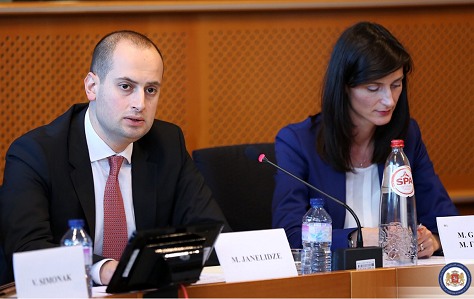Georgia’s Foreign Minister: ‘Delaying Georgia’s visa waiver benefits those who want Europe to fail’

Georgia’s Foreign Minister Mikheil Janelidze has explained why it could be very bad to postpone a visa waiver to the European Union (EU) for Georgian citizens when he spoke at the European Parliament yesterday.
We have a full understanding of difficulties that the EU is facing today from increased migration to the rise of populism and extremist ideologies. However we should also look at the costs of unnecessary and hardly justified delays in making decisions to honour the mutual commitments,” he said.
He added that helping euro-sceptic sentiments in a "devoted and committed partner like Georgia” would hardly help the EU to overcome pessimism within its citizens.
2/2 #Visalib. carries a tremendous symbolic,political & practical importance 4 us and serves as a strong message of #EU’s political support pic.twitter.com/w8zH6buEjC
— Mikheil Janelidze (@JanelidzeMkh) November 29, 2016
"It’s not surprising that after many years of demanding reforms and the acknowledged progress, the legitimate expectations are very high in Georgia. It carries a tremendous symbolic, political and practical importance for us and serves as a strong message of the EU’s political support,” Janelidze said.
1/2 Not surprising,that after many years of demanding reforms&acknowledged progress, the legitimate expectations are very high in #Georgiapic.twitter.com/3ZZJDbSGaV
— Mikheil Janelidze (@JanelidzeMkh) November 29, 2016
The Georgian Foreign Minister said these words at the European Parliament where he took part in the conference Visa Liberalisation as an EU Foreign Policy Tool.
- Janelidze’s statement came one day after European Parliament published its preliminary timetable, showing the consideration of the mechanism for suspension of visa-free regime would begin in the middle of January 2017. Earlier it was believed this would happen before Christmas. Georgia's visa waiver to the Schengen Zone will not be announced before the suspension mechanism is agreed.
In his speech, Janelidze focused on the progress Georgia had achieved in the last three years in all areas covered by the Visa Liberalisation Action Plan. He said Georgia had created many economic opportunities by implementing the Deep and Comprehensive Free Trade Area deal, which was part of the Georgia-EU Association Agreement.
However, this [DCFTA] agreement will not work in its full capacity if Georgia does not let its businessmen, small farmers or entrepreneurs to attend trade fairs, meet European business partners and explore business opportunities in European markets,” he said.
The Georgian high official stressed a visa-free travel regime between Georgia and the EU was by no means additional migration but it fostered better people-to-people contacts, strengthened cultural and business ties and partnerships.
#VisaFree travel regime in our relation is no by any means additional migration,it is strengthened cultural,business ties & partnerships pic.twitter.com/7ZP49UFJuj
— Mikheil Janelidze (@JanelidzeMkh) November 29, 2016
"There is still one pleasant memory among Georgians from Soviet times; the ability to buy a flight ticket for 37 roubles and to fly to Moscow anytime without any barriers. We have to break that. We have to make Europe and European capitals also accessible for Georgians,” Janelidze said.
Instead of embracing all the benefits [the AA deal offers], we see a protracted process of discussions within the EU. We have faced delays associated with EU’s and EU member states’ internal or external policy issues,” he added.
However we are also being held hostage of inter-institutional debates, which hardly reflects the spirit of good partnership. Let’s not frustrate our people, let’s keep them motivated to pursue these demanding reforms and let’s continue jointly moving to Europe free, safe and at peace. Let’s not benefit those who want Europe to fail,” Janelidze said.
Representatives of the European Parliament, European Commission and European External Action Service attended the conference, which was held at the initiative of European Parliament Rapporteur on visa liberalisation for Georgia Mariya Gabriel.
 Tweet
Tweet  Share
Share